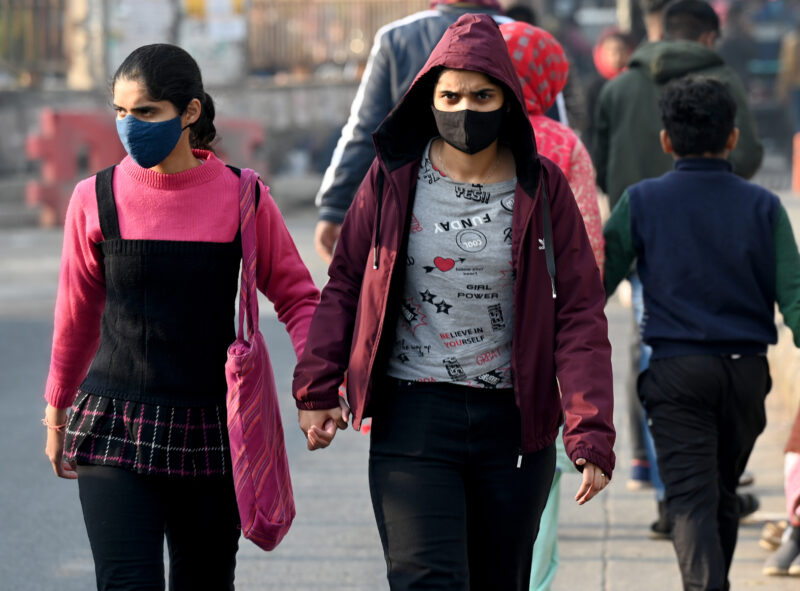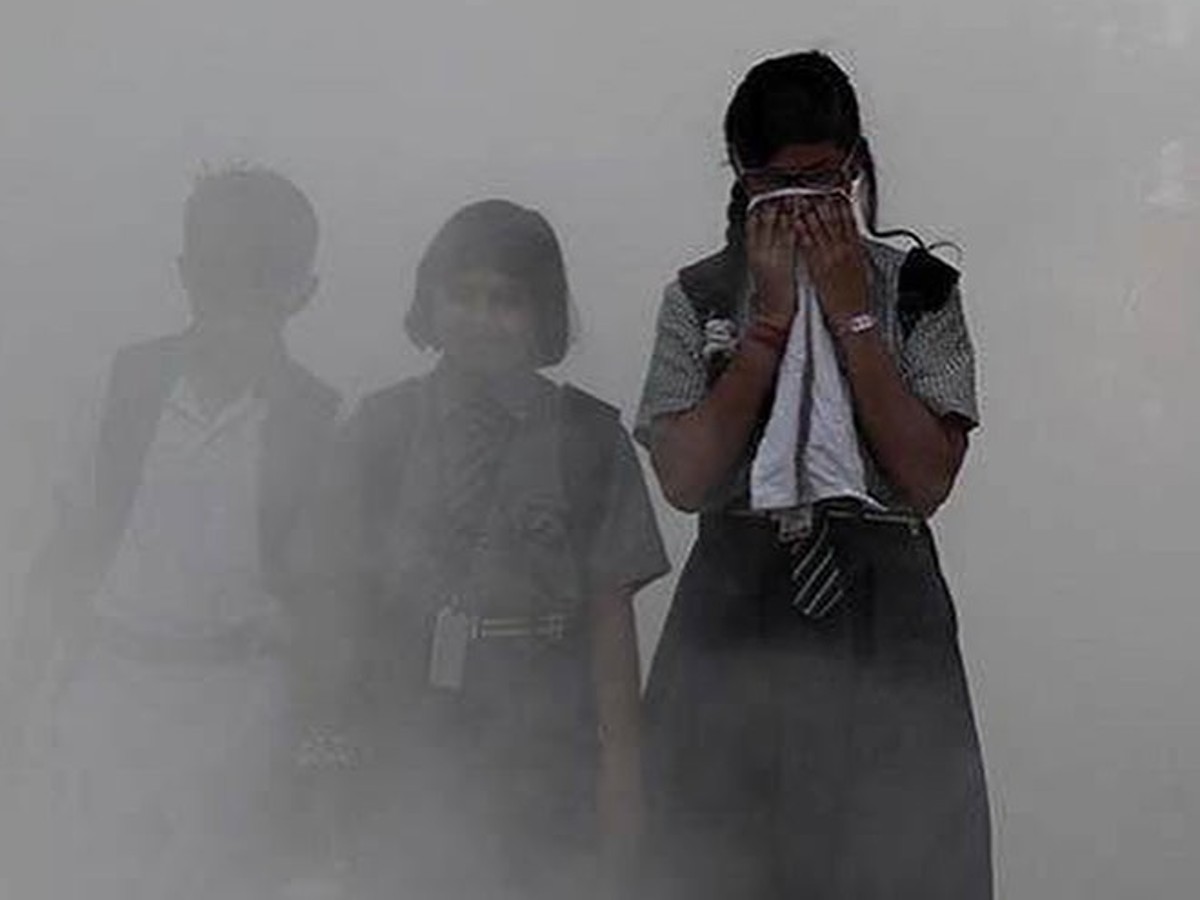Due to worsening air pollution, the number of people complaining of shortness of breath, burning sensation in the eyes, chest infection, coughing, allergy and asthma has increased in hospitals across Delhi.
Although poor air quality is not new to the National Capital Region, the rising levels of pollution during the current winter season has had an adverse impact on people’s health, say various doctors.
“Out of five patients, almost every two patients are facing problems because of poor air quality,” says Dr Neetu Jain, former Senior Resident at All India Institute of Medical Sciences.
“A lot of patients are complaining about shortness of breath, irritation in eyes and prolonged cough,” explains Dr Neetu.
Delhi most polluted city
According to Central Pollution Control Board (CPCB) data, Delhi was the most polluted city in India in 2022, with PM2.5 levels more than double the safe limit. Delhi also had the third-highest average PM10 concentration.
Even though the National Clean Air Programme (NCAP) Tracker report states that PM2.5 pollution in the national capital has decreased by more than 7% in four years, from 108 micrograms per cubic metre in 2019 to 99.71 micrograms per cubic metre in 2022, the Air Quality Index (AQI) has remained hazardous. This is despite emergency steps like banning construction sites, shutting down industries or taking old diesel cars off road.
“The figures are steadily worsening. Not only has there been an increase in respiratory issues, but there has also been an increase in pneumonia cases, which is unusual for this time of the year. In my entire career, I’ve never seen anything like this,” she adds further.
According to AQI recorded on January 17, 11 regions had very poor air quality with the worst being Mundka, which has an AQI of 368, followed by Anand Vihar (344), Dwarka (341), Nehru Nagar (330) and ITO (328).
The IMD had issued a notice stating that intense cold wave may aggravate health issues.
Large number of patients
The top hospitals in the Capital have already been receiving an increased number of patients.
“The number of patients suffering from respiratory illness, lung problems and chronic obstructive pulmonary disease (COPD) has increased. Several patients visit us for treatment after falling seriously ill due to poor air quality. The number of these patients is growing,” says an official of GB Pant hospital on condition of anonymity.
“COVID has worsened the situation and made our lungs more vulnerable. Anyone who had chronic cough and was exposed to COVID is in a situation where poor air quality can weaken his lungs further. Some of the cases we have been addressing are examples of that,” says Dr Prateek Singh, Senior Resident (MD), respiratory department, Ram Manohar Lohia (RML) Hospital.
“Smog harms a human body as much as a cigarette does. What we don’t realise right now is that it (inhalation of smog now) is going to harm us further after 10 years. The number of patients suffering from respiratory illness, lung problems, and chronic obstructive pulmonary disease (COPD) has increased,” adds the RML doctor.
“Respiratory illnesses are common in the winter season and this year also, the number of patients suffering from respiratory illnesses is more than usual. Poor air quality has also become a triggering factor for patients who had existing lung problems.”
Talking about the impact of the poor air quality, Dr Neetu states, “Patients require longer treatment and are getting admitted to hospitals in larger numbers. In some cases, the situation has worsened so much that even inhalers aren’t helping. There are constant complaints of prolonged cough.”
The doctor goes on to say that she has heard patients say that they feel better when they go out of Delhi for vacation.
“Staying indoors is a better option. However, there are a lot of people who stay outside for work like the street vendors. They and traffic police officers are the ones on highways and they get impacted the most. Smoking has also added to the problem caused by poor air quality to lungs. I see a lot of people, especially youngsters, indulging in the activity which can have harmful effects in the long run,” adds the experienced doctor.
“They (the youngsters) are the ones most prone to these respiratory issues. It becomes really important for them to take proper precautions,” says the doctor further.
Another reason behind the increased cases of respiratory illnesses in the winters is people burning plastic and wood to warm themselves.
“This happens everywhere. What people don’t realise is that they’re literally inhaling toxic air,” she warns.

air quality has gone from bad to worse
Patients complain
Her views are backed by the patients.
“I suddenly developed breathlessness and weakness early this week and had to visit OPD at the AIIMS. The doctors there informed me that this was caused by increased air pollution as I spent hours near the road. I never imagined that air pollution would hit me because I never bothered about it like thousands of others,” says Anuranjan Yadav, a middle-aged vendor near the South Extension metro station.
“After doctors advised me to avoid dusty and smoky environments, I’m now using an N-95 mask and drinking plenty of water to minimise the effect of air pollution on my health.”
“Sometimes it gets difficult to breathe. There is a burning sensation in the eyes, and several people have complained of respiratory illness,” adds Yadav.
Yadav has been doing business on the roadside in Delhi for over two decades. He recalled that air quality was better a decade ago.
According to experts on the environment, the severe category of AQI level can be very harmful because inhaling toxic air containing pollutants such as PM 2.5, carbon monoxide, sulphur dioxide and carbon dioxide is dangerous even for healthy people.
Experts’ opinion
Importantly, it can affect people suffering from lung, heart and other diseases even more.
Experts Patriot spoke to say that children and parents must take extra precautions because children who are exposed to higher levels of fine particles in the air known as PM2.5 are more likely to develop asthma and chronic wheezing.
PM2.5 emissions can come from a variety of sources, including power plants, automobiles and home heating.
The particles (about 3% or less than the diameter of a human hair) can enter the lungs and even the circulatory system.
Now that the children have re-joined school after winter vacation, it becomes harder for kids to avoid emissions. In some cases, this can lead to the worsening of asthma.
“The impact of air pollution on asthma is severe when combined with other risk factors such as socioeconomic status,” says an expert.
Asthma symptoms differ from child to child and may worsen or improve over time.
Your child may have only one symptom, such as persistent cough or chest congestion, the expert says further.
Mrinal (name changed), an eighth-grade student suffering from asthma, says, “I’m not a big fan of the winter season. When the weather gets bad, it can be difficult to breathe.”
He says he has to mostly stay indoors to avoid bad air.
“I can’t go outside to play, neither at home nor on the school grounds, because I get a burning sensation in my chest. I avoid going out with friends during the month of January. There are already many activities that I am unable to participate in while my peers can, but these circumstances make it even more difficult for me.”
Mrinal’s mother says that she has to be extra careful with Mrinal and the problem with these many restrictions is that it can have a negative impact on Mrinal’s mental health which leaves them clueless sometimes.
“I discussed it in great detail with my husband and we even planned that we’ll return to our hometown for a while if the pollution continues to increase. Mrinal frequently complains about throat and chest irritation,” she says.
Dr Neetu also talks about the precautions one should take in order to minimise the effects of poor air quality.
“Wear N-95 masks although I understand that they are a bit expensive. For those, who cannot afford it should wear two layers of masks. Avoid going out in the morning and evening when there’s smog outside. Use air purifiers that cover the whole length of your room. Eat green vegetables and drink water regularly. Exercise indoors and avoid going for a run,” she advises.





